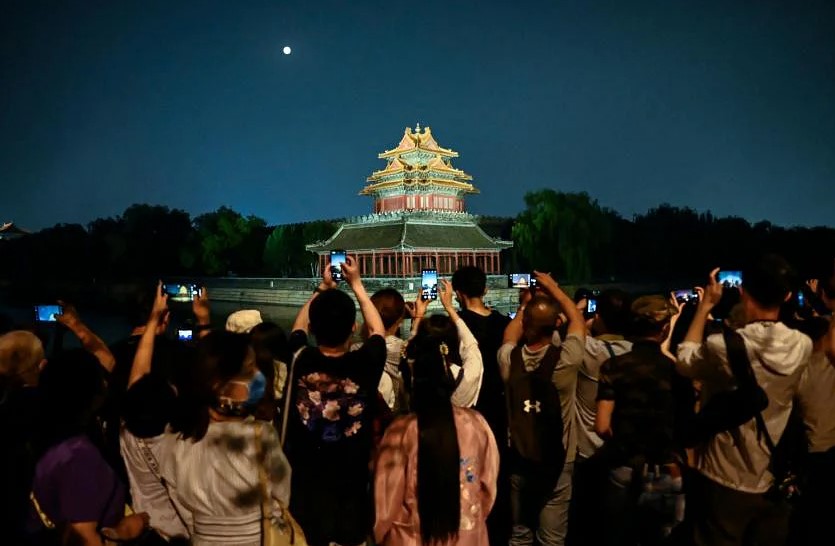- Travel over three-day break declines as Covid outbreaks spread
- Premier Li says more effort needed to spur waning demand
China’s Premier Li Keqiang called for more policies to drive up consumption in the economy as latest figures show a further plunge in travel and spending over a three-day public holiday amid tight Covid controls.
Tourism revenue declined 22.8% to 28.7 billion yuan ($4.1 billion) over the Mid-Autumn Festival from a year ago. Compared with pre-pandemic levels in 2019, revenue was down 39.4%, worse than last year’s 21.4% drop, according to figures from the Ministry of Culture and Tourism. The number of trips fell 16.7% to 73.4 million from the same period last year.
Staycations
Tourism over the Autumn festival continues to fall as restrictions tighten

The figures came as China’s State Council pledged more support to stabilize the economy. At a meeting on Sept. 8, Premier Li called for efforts to solve the “key problem of insufficient demand” in the economy and boost consumption as a main growth driver. He pledged to further expand investment in order to create demand and lift confidence, according to a report by the official Xinhua News Agency published Monday.
China “will adopt multiple measures to stabilize growth, employment and prices,” Li said. The economy is facing “slight fluctuation” as it recovers, and the current stage is a critical one that requires greater urgency, like when one climbs up a hill facing headwinds, he said.
Liu Peiqian, chief China economist at NatWest Group Plc, said the focus of the State Council meeting was on implementing policy measures already outlined, rather than a ramp-up of new support.
“It did not announce any new or additional stimulus but the focus is still largely on effectively implementing what has been in place,” she said. An emphasis on monitoring the progress of the support measures could mean more policy announcements from local governments, she said.
Infrastructure Boost
Beijing’s push to boost growth has centered around increasing infrastructure spending in the economy and giving tax breaks to businesses hurt by Covid restrictions. At the State Council meeting, Li called for faster construction of infrastructure projects and more long-term bank loans to support them. He also called for an increase in infrastructure funding from state policy banks based on the actual need of local areas.
Li said China has reserved its policy tools for this year as it hasn’t significantly expanded the fiscal deficit or issued an excessive amount of money over the past few years. The comments were made after a meeting with senior officials that were sent on inspection trips to various localities to assess the rollout of stimulus policies.
Support for consumers hit by lockdowns has been limited, with economists not seeing a boost to confidence until Covid restrictions are materially eased. That seems unlikely given that local governments are tightening controls as the Communist Party prepares to hold an important leadership congress in mid-October. In Beijing, employees must now show a negative Covid test taken within the previous 48 hours to return to work after the Mid-Autumn holiday, compared with 72 hours previously.
Many other cities also increased the frequency of mass testing after the National Health Commission asked local authorities to test residents regularly regardless of infection levels.
Tourism Slump
China’s tourism revenue during major holidays fell from 2021

Ahead of the Mid-Autumn Festival, the government had urged residents to curb travel to avoid Covid outbreaks from spreading. Major cities and tourist hotspots like Chengdu in Sichuan province imposed lockdowns earlier this month. Xinjiang, in western China, also saw the number of visitors plummet in August after a snap lockdown in some places to contain a surge in cases.
The drop in travel spending was smaller than the 43% decline over the five-day Labor Day holiday in May, but worse than the 12.2% drop over the three-day Dragon Boat Festival in June.
The economy is showing strain from all sides. Factory activity contracted for the second straight month in August, while export growth — a key support to the economy since 2020 — slowed more than expected. Subdued consumer inflation and a slow recovery in bank lending also indicate weak demand in the economy. Growth is expected to weaken to just 3.5% this year, according to a Bloomberg survey of economists, far below the official target set early this year of “around 5.5%.”
Official data to be released Friday will likely show a mixed picture, with industrial production flatlining in August while retail sales recovered slightly, according to economists surveyed by Bloomberg. The People’s Bank of China will likely keep the interest rate on its one-year policy loans unchanged on Thursday as the currency continues to come under selling pressure.
Source: Bloomberg


